#liseys old art
Note
Ur that guy who made the shaken baby syndrome mk art, right?
Yep👍 it was a gift for @/TripTickett on Twitter with their designs of Wukong, Mac, and MK. It’s a bit old now and I’d definitely draw some things differently, but I still enjoy their family weirdness haha

#liseysart#lego monkie kid#lego monkey kid fanart#comic#asks#lmk fanart#lmk macaque#lmk sun wukong#lmk mk#lmk xiaotian#lmk six eared macaque#lmk shadowpeach#liseys old art
2K notes
·
View notes
Text
BILLY SUMMERS by Stephen King: A Review
A few years ago we went to see Tony Bennett at the Hollywood Bowl.
Bennett, age 93 at the time, sang several of his hits…several times. He introduced his band…several times. And while that magnificent voice wasn’t as strong and as steady as it once was, it sounded strong and steady enough.
Okay, so it wasn’t primo Tony Bennett -- it was still Tony Fncking Bennett!
Which brings us to Stephen King’s 2021 novel Billy Summers.
It ain’t primo Big Steve King, but it’s still Big Steve King.
And it’s the first one of his books I enjoyed all the way through since…gawd…Misery.
It’s been a long dry spell, Steverino.
. . .
Backstory first, then on to the meat of the matter:
I was a fan of King’s w-a-a-a-y back in his Cavalierdays when he cranked out short stories for one of the bargain basement Playboy knockoffs (I didn’t buy Cavalier for their dirty photos of nekkid ladies, I bought it for their dirty comics by the late great Vaughn Bode’).
Carrie wowed me.
‘Salem’s Lot felt like a good old fashion pulp horror novel.
The Shining ranks as his best work.
Night Shift offers a good introduction to some of his best early short fiction.
The Stand ran a little too long, a little too disjointed, but I enjoyed it.
The Dead Zone was another masterpiece.
Firestarter? Cujo? They can’t all be winners.
Danse Macabre is a fine example of King’s critical writing.
Different Seasons proved nothing short of brilliant.
Christine got me to blink.
Pet Semetary ended one sentence before it should have begun.
Skeleton Crew offered good midlist King short stories.
It? Seriously?
Misery showed him back in rare form, one of his very best.
The Tommyknockers? The Dark Half? Okay, I guess…
Four Past Midnight? Two adequate stories and two major disappointments, and disappointments because “The Langoliers” and “The Library Police” both start oput oh, so strong then King gives up and lapses into his favorite hackneyed trope: The ol’ booga-booga.
Needful Things…?
Up until that point I’d been buying every Stephen King novel as soon as it came out in hardcover (The Dark Tower series excepted because I didn’t feel like starting a series until it was wrapped up, and the Bachman books because I waited until they came out in an omnibus edition).
But when I bought Needful Things I managed to make it halfway through, stuck a book marker in the middle, and didn’t take it down off the shelf to finish it until later.
Ten years later,
to be exact.
Now I enjoyed Gerald’s Game (even though it read like a variant of Misery), but not enough to get me back on track reading everything King wrote.
On Writing is not the best book on the art & craft of writing but is a good book on the art & craft of writing (and it’s short!) and it offers some of King’s personal insights into his career and works and to be perfectly honest, it’s worth reading for the poison ivy story alone.
From A Buick 8 sounded like just the sort of story that’s right up my alley and it would have been…
…if he kept it down to 3,000 words or so.
Lisey’s Story offered a premise that caught my interest, then collapsed into Just Another Long Stephen King Booga-Booga Novel.
(I didn’t read “Head Down” in Nightmares & Dreamscapes until many years after it was published and while the rest of the book is adequate-to-good Stephen King, holy shamolley this essay on his son’s Little League is one of the finest things he ever wrote and is highly recommended.)
So I am like really really gunshy about new Stephen King books although I still enjoy most of his earlier work.
. . .
As noted above, Christine marked the moment I first began have specific problems with King’s style.
He tells you what he’s going to tell you, he tells you, then he tells you what he just told you.
That’s great if you’re on the radio.
It grows tiresome in print.
One of these days I’m going to try an experiment:
I’ll but a King novel I haven’t read, tear out every other chapter, X out every even number page, highlight the first sentence of every remaining paragraph, and see if it results in a readable short story.
I’m betting it will.
When it comes to characterization and dialog and descriptive passages, King is an undisputed master.
But gawd! He d-r-a-a-a-g-s it out…
So I began Billy Summers with great trepidation.
. . .
First the really good news: \ It kept my interest from beginning to end and while I have some issues with some specifics, Big Steve did not let us down.
Bravo!
The not bad but less than enthusiastic news: \ There are weak spots and problems, but not enough to spoil enjoyment.
Premise: Billy Summers is a hit man hired to kill a prisoner on his way to the court house. Since said prisoner is fighting extradition, Billy needs to be in place for several weeks, ready to do the job on short notice. The guys who hire Billy think he’s dependable but somewhat dim (he’s not; on the contrary he’s smart enough never to show the folks he works with just how smart he really is).
Clever twist: The guys who hire Billy come up with a cover story for him, that he’s a writer working on a book in an office that overlooks the courthouse where he’s going to shoot the prisoner.
Irony: Billy, being much more brilliant than they realize, actually starts writing a book, a thinly disguised autobiographical novel about his hellish childhood and his career as a Marine sniper.
The best part of the book is the first half (more like the first 40%) where Billy goes undercover, befriends the people he’s living and working beside, but slowly realizes there’s much, much more to this assassination than what’s been presented to him.
So far,
so good.
After Billy scores his hit (just under the halfway mark) he goes to ground to wait out the massive police search for the sniper and other hit men who’ve been sent to make sure he never talks.
It is here he meets a Damsel-In-Distress…but more on that in a bit.
A little past the two-thirds mark they go on the move to find the real reason why Billy was hired…and why the guys doing the hiring want him dead now.
Last third offers some bang-bang-shoot-em-up-one-two-three, then a logical denouement.
Compared to the massive disappointments I found in far too many of King’s other books, Billy Summers fills the bill quite nicely and I recommend it as a good summer beach read.
Along with The Shining, Misery, The Dark Half, and Lisey’s Story, it focuses on a writer struggling to get a work completed. King used this concept many times and each time he seems to add some new insight on the challenge and calling of writing.
But…(and you knew that was coming, didn’t you?)…without revealing any spoilers, there are some issues I have with the book, issues that keep it down in the Good Read, not Brilliant! bin.
. . .
Not going to start with the somewhat fanciful gangsters hiring Billy. They’re fine for melodramatic fiction, very sharply written and defined.
They place the novel solidly in the thriller genre, and I can easily imagine this part of the book being a 1960s Fawcett paperback original with a Robert McGinnis cover.
The writing in this part of the book is superb, and those seeking to sharpen their own craft can look upon the works of the mighty and despair. Character / dialog / setting are not just expertly done but brilliantly done.
One reason this part is so enjoyable is that while King still falls back on his tell ‘em what you’re gonna tell ‘em /tell ‘em / tell ‘em what ya told ‘em tricks, they work in the context of the story because…
The guys who hired him think Billy can’t remember stuff so they frequently repeat their instructions
Billy analyzes what they say and do in his mind, trying to figure out what their real game is
Billy -- writing a novel as part of his cover -- reinterprets his experience on the page
You barely notice King sneaking this one past you.
Bravo,
again.
The problem is this part of the novel doesn’t mesh up with the Damsel-In-Distress part.
Years ago I read something King wrote (in On Writing? Perhaps…) about his trick for breaking a story log jam (come to think of it, it may have been in his intro to the Bachman books): Turn the story into a stage play.
And that’s what happens when the D-I-D arrives.
They talk in Billy’s hideout for several days until Billy decides it’s safe to move.
Now, to his credit King breaks this up by interspacing pages from the novel Billy keeps writing (now for his own compulsory reasons, not as cover), and those pages include a lot of very well written Gulf War action (King’s research is superb, and if he’s bullshitting it’s brilliant bullshitting that passes the smell test and comes out like roses).
But the main story itself pretty much comes to a screeching halt, and without the distraction of the war scenes, would be pretty slow moving and talky.
And here’s the problem: It really doesn’t fit with the well written opening King gave us.
They’re not just two different stories, they’re two different kinds of stories.
The middle portion of Billy Summers would work fine as a stage play with a guy on the lam forced to take in a D-I-D for fear if he didn’t then he would be exposed.
But for that story to work, everything that lead up to the killer hiding needs to be gradually revealed bit by bit.
You can’t show all that then reiterate it.
It spoils the suspense, the tension…
The frisson.
Again, this is not bad, but it’s not primo.
I’m reminded of Robert Armstrong dragging Fay Wray along to meet King Kong just because every movie needs a romantic interest.
Which is another issue we need to discuss. Without spoiling anything or getting too explicit, the D-I-D has gone through a pretty traumatic experience.
She bounces back too quick.
I’m sure among the literally millions of women who suffered similar there are many who recovered physically and emotionally very, very quickly but this just doesn’t ring true in Billy Summers.
In a stage play? Where artifice and theatricality are not just accepted but celebrated?
Yeah, maybe you could get away with it there…
Maybe.
Once Billy and the D-I-D are on the move, the story quickly morphs into Stephen King’s Travis McGee fan fic.
McGee was a modern day knight errant, a “salvage expert” operating out of a houseboat called the Busted Flush in Florida, encountering D-I-Ds at every turn and helping them recover vast missing fortunes for 50% of the recovered funds.
(Some knight errant.)
The Travis McGee stories are good fun, written by John D. MacDonald to be both fast paced and fulla philosophizin’. Lots of people love them and Stephen King clearly does because in this part of the book Billy is clearly McGee, Bucky (his only friend) is McGee’s brilliant good buddy Meyer, and the D-I-D is the D-I-D.
(And don’t tell me King didn’t do this consciously, not when he writes “the girl, the gold watch, and everything” into a line of dialog clearly referencing one of MacDonald’s novels by that very title.)
Also in this portion we learn Bucky’s hideout is not far from where the haunted Overlook Hotel burned down and there are a couple of scenes where Billy encounters possible sinister supernatural forces and I was thinking if King dragged in some booga-booga I was going to get so %#@&ING MAD!!! but fortunately he’s just having some fun with us and doesn’t go down that path.
Good call,
Steverino.
Billy keeps working on his novel even though he has no clear reason to do so other than self-satisfaction, and finally it’s time to confront the bad guys and find out Who Is Behind All This and engage in the aforementioned bang-bang-shoot-em-up.
Okay, this is where the book hits its biggest credulity problems.
The action staging is adequate, not great but certainly far from bad.
The bad guys’ reactions to Billy’s justifiable demands to know what the hell is going on?
Not very plausible, nor consistent with what was established earlier.
There is no honor among thieves and even less among goombata.
Also: Several key characters pop up or are referenced when there has been no mention of them prior to this point.
That’s a cheat.
Especially regarding the master villain.
There are two action pieces at the end, one to find out who is responsible for the contract on Billy, the last to deal with that person.
That villain in this sort of story needs to be a presence much earlier, even if only by mention.
They’re too important to spring on us in the last 100 pages of the book.
Some foreshadowing is required.
(And while they are a roman a clef, that doesn’t excuse springing them on us unannounced.)
As Elmore Leonard observed in his novel Get Shorty, endings are hard.
I think by the time King reached the last 100 pages of Billy Summers he just sought to pack it in as fast as possible.
I’m grateful he avoided booga-booga.
Finally, while Quentin Tarantino certainly made packing pop references into modern fiction hip. King mined that vein long ago. He does it a lot here, too, and in a manner I found distracting.
Billy the literary genius Marine sharpshooter does not seem to be the sort who would give a rat’s patoot for movies and TV shows, especially movies and TV shows about the sort of stuff he’s been involved in.
I absolutely believe he’s an Émile Zola fan…and I absolute believes he finds some modicum of amusement in the Archie comics he carries around for cover in order to fool those he kills for that he’s ot-nay oo-tay ihjt-bray.
But I can’t see him as the sort to be interested in television at all, especially not modern pop culture.
I think King missed a bet by not showing him from the beginning as a hater of TV in general and one type in particular because that could have laid track to the ultimate boss; the idea occurs to King far too late in the story and seems roughly shoehorned it.
I also think his choice of “The Teddy-Bears’ Picnic” as the song sung by his Marines rings false.
That’s a British favorite (or should I say favourite?), not an American one.
The song is sung in Robert Aldrich’s 1970 WWII film Too Late The Hero by a somewhat daft Scottish commando as his unit moves out on patrol into the Japanese held jungle. Did King consciously or subconsciously lift this idea from that movie or is it just coincidence?
(Personally I think Kubrick caught the USMC’s tone perfectly seventeen years later in Full Metal Jacket when his Marines patrol the blitzed ruins of Huè while singing “The Mickey Mouse March” but knowing the House of Mouse, getting the rights to that probably proved impo$$ible.)
. . .
In other words…
Good book.
Good dialog
Good writing.
Good characterization.
Plot could be improved,
but it’s serviceable.
Increasingly far-fetched
but still entertaining.
© Buzz Dixon
Billy Summers
was recommended
by Adam-Troy Castro.
Thanx for the tip!
1 note
·
View note
Text
Welcome to ©FreyjaofWar’s Blog! :)



☏… 
hello? Oh hi, it’s so lovely to meet you!
✿(っ^▿^)Just call me Freyja:)
I am: 20 years old • bisexual • she/her
My Blog/Feed: I really enjoy looking into dark/light/romantic academia, and tend to roblog a lot from those tags!
So please, see me as your friendly neighborhood artsy encyclopedia! One day we’re talking about libraries, the next we’re looking into oil paintings on old museum walls in abandoned district’s.
I very much have an interest in: cottage core, books (notes and quotes), cute animal pictures as well as… the moon, I guess? So expect to see a lot of that! In terms of my other posts, I really just share a lot of romanticism in art, music and poetry.
I very much adore the entire concept of love in its every form:)
“Star light, star bright, first star I see tonight. Wish I may, wish I might, have the wish I wish tonight.”
“Please, always you.”
- The Drawing of the Three: The Dark Tower
Stephen King
Please don’t mind the occasional meme themed text post as I usually just post whatever comes to mind! The posts can be very random or just overall way too specific at times, but I show absolutely no signs of stopping — this is who I am now LMAO.
I hope you decide to stay with me! Have a good day/night! x ☜(ˆ▿ˆc) ✿



❅Status❅
now listening to: lonely cowboy, kaleo
now reading: lisey’s story, stephen king
now watching: n/a
dms: closed :(

7 notes
·
View notes
Text
Entertainment Weekly, June
Cover: The Pride Issue cover 3 of 4 -- Lena Waithe

Page 3: Contents, other covers featuring Lil Nas X, Mj Rodriguez, Bowen Yang
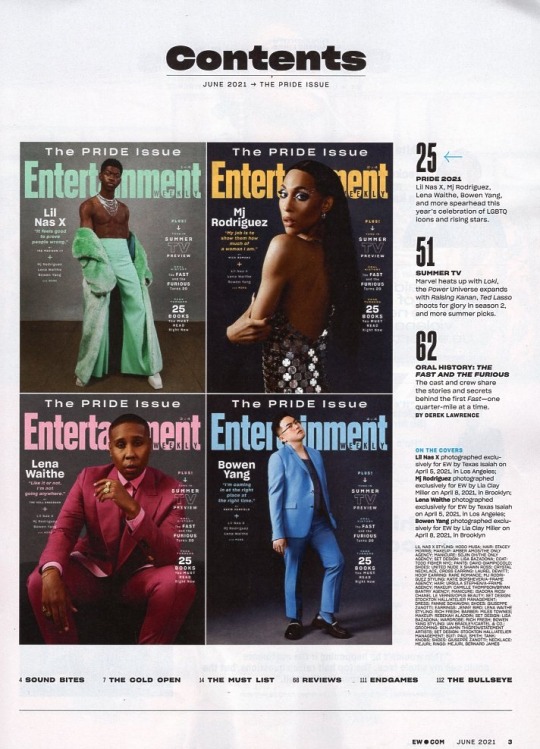
Page 4: Sound Bites
Page 7: The Cold Open
Page 14: The Must List -- In the Heights
Page 15: Instructions for Dancing by Nicola Yoon, Iceage -- Seek Shelter, Ziwe
Page 18: Trying Q&A with Esther Smith and Rafe Spall, Day Zero by C. Robert Cargill
Page 20: Milestone Returns #0: Infinite Edition, In Treatment
Page 21: Brat: An '80s Story by Andrew McCarthy, The Empty Man
Page 22: My Must List Pride Edition -- Niecy Nash
Page 25: Pride 2021
Page 26: Lil Nas X -- the 22-year-old rapper is still breaking barriers one song and several clapbacks at a time
Page 29: St. Vincent -- the chameleonic singer-songwriter returns with Daddy's Home, an adventurous new album inspired by her father's prison time
Page 30: Olly Alexander -- after a lauded lead turn in It's a Sin, the artist returned with the single Starstruck, from his newly solo musical act Years & Years
* Rostam -- the new solo album from the multi-instrumentalist is rooted in society's fear of change
Page 32: Lena Waithe -- the producer and actor, and the new star of Master of None season 3, wants to create provocative art while elevating voices
Page 35: Josh Thomas -- the Australian creator-star of Everything's Gonna Be Okay is telling his story through his art
Page 36: Meet Your Maker -- Natalie Morales -- the queer star directs her first film(s), the sharp indies Plan B and Language Lessons. Here's what got her behind the camera
Page 37: Joshua Safran -- the man behind Alex Parrish's attitude and Blair Waldorf's one-liners shares how his sexuality helps him empathize with his characters
* Brandon Taylor -- coming off his explosive, best-selling debut novel Real Life, the lauded author is looking toward his second act and beyond
Page 38: Mj Rodriguez -- with the final season of the history-making FX drama Pose, it's leading lady is ready to claim what's hers
Page 41: Colman Domingo -- after decades of stellar work, the scene-stealer is front and center on Euphoria, Fear the Walking Dead, and more
Page 42: Auli'i Cravalho -- the star of Disney's Moana proved how far she'll go to be her authentic self, and is now focused on joy and inclusion
Page 43: Queen Supremes -- the international RuPaul's Drag Race winning class speaks power to the franchise's worldwide domination and looks ahead to a fab future
Page 44: Bowen Yang -- the Saturday Night Live breakout is defining funny for a whole new generation and pushing boundaries in the process
Page 47: Margaret Cho -- the stand-up comedian plays the lesbian pal we all wish we had in the comedy Good on Paper
Page 48: Molly Bernard -- after playing Younger's pansexual publicist, she's ready to explore the full spectrum of queerness
* Josie Totah -- from Disney's Jessie to the Saved by the Bell revival and Amy Poehler's Moxie, the actress has made a name for herself twice and Hollywood's paying attention
Page 49: Calendar -- 10 upcoming LGBTQ projects to get excited for --from eye-opening documentaries to sweeping romances, there is plenty to add to your Pride watch queue
* Pride season's 6 essential reads
Page 51: Summer TV Preview
Page 52: Loki with Tom Hiddleston
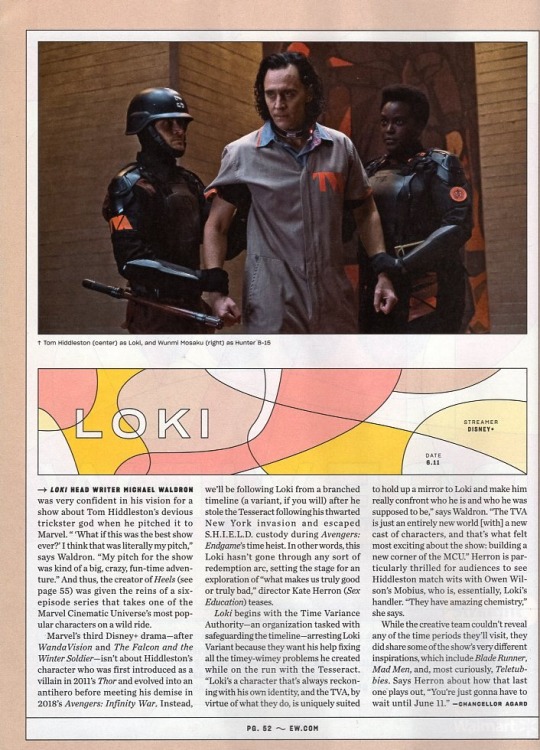
Page 53: Panic, The Celebrity Dating Game, Gossip Girl
Page 54: September Mornings, Schmigadoon!, Masters of the Universe: Revelation, Ted Lasso
Page 55: Heels, The Good Fight
Page 56: Power Book III: Raising Kanan
Page 57: Sweet Tooth, Blindspotting, Kevin Can F**k Himself, Mr. Corman
Page 58: We Are Lady Parts, Love Victor, Sex/Life, Turner & Hooch
Page 59: Physical, Hit & Run, American Rust
Page 60: Bosch, Marvel Studios' What If...?, Lisey's Story -- Q&A with Julianne Moore
Page 61: Calendar
Page 62: The Fast and the Furious oral history -- how did a little movie about underground racing speed off to become one of the most profitable franchises in history? The cast and crew reminisce about 20 years of Fast, one quarter-mile at a time
Page 68: News + Reviews -- Nominate Them, You Cowards -- on July 13, the Academy of Television Arts & Sciences will announce the 2021 Emmy nominees. Here are some standout shows and performances we insist not be overlooked
Page 72: Movies -- Summer Star -- taking the lead in blockbusters A Quiet Place II and Jungle Cruise, Emily Blunt is the face of Hollywood's comeback summer
Page 74: Making the Scene -- Army of the Dead -- Zack Snyder explains how he bet big on destroying Las Vegas in his bloody zombie heist movie
Page 75: Oxygen, The Woman in the Window -- the journey from smash best-seller to star-studded streaming thriller was long and fittingly bizarre
Page 76: Meet the Fab G -- director Kay Cannon on how Billy Porter found a fresh, inclusive take on the fairy godmother in the new Cinderella
Page 79: My Favorite Shot Pride Edition -- Sebastian Lelio, A Fantastic Woman -- the Chilean director revisits a gravity-defying sequence in his groundbreaking Oscar-winning drama
Page 80: TV -- The Underground Railroad
Page 81: The Upshaws
Page 82: Oral History -- in 2011, Teen Wolf premiered on MTV. Ten years later, we look back at the pilot episode that introduced us to Scott, Stiles and the werewolves of Beacon Hills -- Jeff Davis, Tyler Posey, Russell Mulgahy, Dylan O'Brien, Crystal Reed
Page 84: What to Watch
Page 86: Music -- Miranda Lambert Q&A -- for The Marfa Tapes, Lambert decamped to the quiet artsy town in West Texas and recorded songs around a campfire. She talks to EW about the album and being an introverted superstar
Page 88: Ear Kandi -- Xscape member and current Real Housewives of Atlanta star Kandi Burruss reflects on the hits she's made for Destiny's Child, *NSYNC, TLC and more
Page 89: The Black Keys
Page 90: Books -- summer books special -- a comedy of eras -- in a sharp new essay collection, The Wreckage of My Presence, actor Casey Wilson weaves big feelings into even bigger laughs
Page 92: Poetic Justice -- prolific romance writer and political powerhouse Stacey Abrams bookend an incredible year with more thrills, this time in her first novel not written under her pen name Selena Montgomery
Page 93: Author Spotlight -- Silvia Moreno-Garcia -- Velvet Was the Night
Page 94: Fatal Attraction -- inside the intoxicating depravity of Animal, Lisa Taddeo's meaty follow-up to Three Women
Page 95: Critic's Pick -- The Great Mistake by Jonathan Lee
Page 96: Critic's Pick -- In the Country of Others by Leila Slimani
Page 97: The Conversation -- Taylor Jenkins Reid and Paula Hawkins -- the names behind Daisy Jones & the Six and The Girl on the Train are coming for your beach tote
Page 98: Q&A with Zakiya Dalila Harris -- The Other Black Girl, former book editor Zakiya Dalila Harris' genre-bending evisceration of workplace privilege, is set to become the debut of the summer
Page 99: Critic's Pick -- Afterparties by Anthony Veasna So
Page 101: Q&A with Billie Eilish -- in between winning Grammys and releasing her sophomore album, the pop star is publishing her first (self-titled) book, a collection of never-before-seen pics of her early life on the road
Page 103: Parental Guidance -- your crib sheet on the best entertainment for kids from toddlers to tweens
* Q&A with Gabrielle Union-Wade and Dwyane Wade -- the actress and her NBA legend husband, bring it on with their new children's book Shady Baby
Page 112: The Bullseye
#tabloid toc#tabloidtoc#pride#lena waithe#lil nas x#mj rodriguez#bowen yang#loki#loki the series#loki spoilers#tom hiddleston#hiddles#michael waldron#kate herron#loki variant#in the heights#trying#esther smith#rafe spall#niecy nash#st. vincent#st vincent#olly alexander#josh thomas#natalie morales#joshua safran#brandon taylor#colman domingo#auli'i cravalho#margaret cho
51 notes
·
View notes
Text
I got tagged by a few people to do this on my last account but it was during my hiatus where I debated remaking, but I know for a fact that @herbgerblin, @ungarmax, and @kravkalackin tagged me for this and I wanna do it now! If YOU wanna be tagged, then, guess what! You’re it!
1. Name/nickname: Nick, Dagger, or Graves, any is fine.
2. Gender: My gender is sad man, but fr, I’m a guy.
3. Star sign: Aquarius
4. Height: 5′3″
5. Time: 8:30PM
6. Birthday: Feb 13
7. Favorite bands/groups: FoB, P@td, Celtic Women, Backstreet Boys? Rhett and Link’s old music? Idk I listen to random stuff.
8. Favorite solo artist: Lemon Demon?
9. Song stuck in my head: Counting Bodies Like Sheep to the Rhythm of the War Drums
10. Last movie: The Little Mermaid
11. Last show: I think the last thing I watched was Tokyo Ghoul with some friends.
12. When did I create this blog: July 20th, 2021, a fresh start because I’m tired and pushed myself too hard.
13. What do I post: My art! And hopefully things about myself, like this!
14. Last thing I googled: The movie series Tremors to show a coworker what it was.
15. Other blogs: My ex blog is @nickleerie, and I have @daggergraves for reblogging, but I forget about it. My hiatus sorta shut down my sharing part of my brain.
16. Do I get asks: Not so far! :)
17. Why did I choose this url: I like it, it makes me happy and feels on brand without being uhm… just a name.
18. Following: 28
19. Followers: 192
20. Average hours of sleep: 6
21. Lucky number: 13
22. Instruments: I used to play the chimes, the xylophone, and snare drum, a little keyboard here and there but I was never great. I own zero instruments at this time in my life.
23. What am I wearing: A My Hero Academia t-shirt that I tie-dyed in my apartment parking lot, shorts, and flip flops.
24. Dream job: Peacefully creating content.
25. Dream trip: I just want to go somewhere new with my friends, Japan would be fun, or Ireland.
26. Favorite food: Basic white American man food— bacon cheeseburger. Or potato, the form does not matter. Give potat.
28. Favorite song: Having a single favorite song is too hard for my small brain.
29. Last book read: Lisey’s Story by Stephen King
30. Three fictional universes you’d like to live in: Pokemon universe (so what if these weird god monsters and rich people keep trying to destroy the world, children always win), I would like to go be a hobbit in LOTR, fuck it, TAZ Balance land.
9 notes
·
View notes
Text
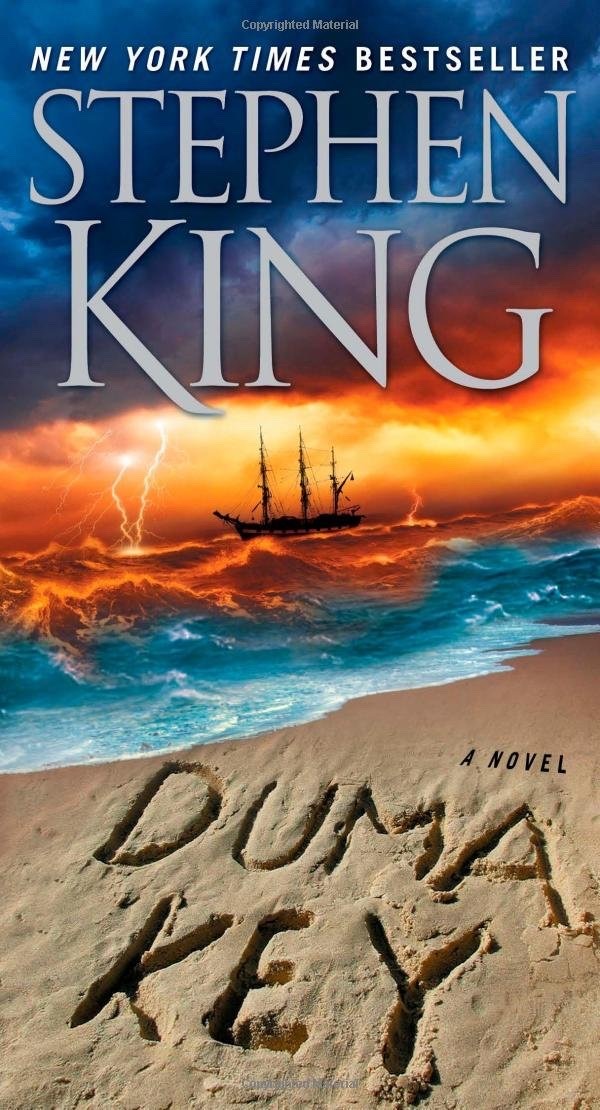
Duma Key - Stephen King
A terrible construction site accident takes Edgar Freemantle's right arm and scrambles his memory and his mind, leaving him with little but rage as he begins the ordeal of rehabilitation. A marriage that produced two lovely daughters suddenly ends, and Edgar begins to wish he hadn't survived the injuries that could have killed him. He wants out. His psychologist, Dr. Kamen, suggests a "geographic cure," a new life distant from the Twin Cities and the building business Edgar grew from scratch. And Kamen suggests something else. "Edgar does anything make you happy?"…"I used to sketch."…"Take it up again. You need hedges . . . hedges against the night." Edgar leaves Minnesota for a rented house on Duma Key, a stunningly beautiful, eerily undeveloped splinter of the Florida coast. The sun setting into the Gulf of Mexico and the tidal rattling of shells on the beach call out to him, and Edgar draws. A visit from Ilse, the daughter he dotes on, starts his movement out of solitude. He meets a kindred spirit in Wireman, a man reluctant to reveal his own wounds, and then Elizabeth Eastlake, a sick old woman whose roots are tangled deep in Duma Key. Now Edgar paints, sometimes feverishly, his exploding talent both a wonder and a weapon. Many of his paintings have a power that cannot be controlled. When Elizabeth's past unfolds and the ghosts of her childhood begin to appear, the damage of which they are capable is truly devastating.
Read if You Like:
Horror
Thriller
Fantasy
Supernatural
Mystery
Suspense
Art/Painting
Recommended if You Enjoy:
Stephen King (Rose Madder, The Dark Half, Bag of Bones, Lisey’s Story)
4.5/5
#Duma key#stephen king#authors#book recommendations#books#books & libraries#libraries#literature#what to read#what to read next#book reading#good books to read#horror#thriller#fantasy#supernatural#mystery#suspense#art#painting#rose madder#the dark half#bag of bones#lisey’s story#book list
2 notes
·
View notes
Text
Longbow The Saga of Roland Inness 1
LONGBOW THE SAGA OF ROLAND INNESS 1 >> DOWNLOAD LINK
vk.cc/c7jKeU
LONGBOW THE SAGA OF ROLAND INNESS 1 >> READ ONLINE
bit.do/fSmfG
long boy lisey
lawn boylisey's story long boy explained
the long boy stephen king
the long boy
The Saga of Roland Inness series begins with the tale of a fourteen-year-old boy who has extraordinary skill with a longbow. It is a story of courage, loyalty, Title: Longbow (The Saga of Roland Inness) Item Condition: used item in a very good condition. Binding: Paperback Language: english. Book Details. Roland Inness is a peasant boy with an unusual talent—and a secret. He has learned the art of making a longbow and the skill to use it with deadly accuracy. AbeBooks.com: Longbow (The Saga of Roland Inness) (9781502490568) by Grant, Wayne and a great selection of similar New, Used and Collectible Books available Worse yet, he uses his longbow, a weapon outlawed and suppressed by the Norman overlords of England. Longbow (The Saga of Roland Inness) (Volume 1). by Wayne Grant includes books Longbow, Warbow, The Broken Realm, and several more. See the complete The Saga of Roland Inness series book list in order,Longbow is the first book in the Saga of Roland Inness series. I actually began telling this story to my two sons when they were middle and elementary school Roland Inness desperately needs meat for his starving family, but he takes the wrong deer on the wrong nobleman's land. Worse yet, he uses his longbow, Roland Inness is a peasant boy with an unusual talent—and a secret. He has learned the art of making a longbow and the skill to use it with deadly accuracy. Why Longbow (The Saga of Roland Inness) (Volume 1): Wayne Grant: 8601418375555: Amazon.com: Books · More like this.
https://cawequtomime.tumblr.com/post/667573426469388288/diebold-opteva-562-manual, https://vebadihaj.tumblr.com/post/667635108104306688/bulleh-shah-books-in-hindi-pdf, https://kiwoqiwaripi.tumblr.com/post/667581235085918208/pdp-encore-drum-set-assembly-instructions, https://pakurasufup.tumblr.com/post/667615095502848000/wolfson-and-pasachoff-pdf-printer, https://nebaguqiwe.tumblr.com/post/667576240820125696/threshold-windham-desk-assembly-instructions.
0 notes
Text
Can Salem’s Lot and Firestarter Reignite Stephen King at the Box Office?
https://ift.tt/2S0a65g
It was almost exactly four years ago when It: Chapter One (as it came to be called), the first of two movies based on Stephen King’s classic 1986 novel, opened in theaters to a record-shattering $124 million in its first weekend. Adjusted for inflation, the film went on to become the highest grossing horror movie (and King adaptation) of all time, earning $701 million worldwide. Not even the vampires of ‘Salem’s Lot multiplied at that rate!
It’s explosive and unprecedented opening coincided (and perhaps helped drive) a new wave of Stephen King adaptations, both as movies and TV productions, and new generations of filmmakers and hungry-for-content streaming services eagerly tapped into the author’s vast collection of works.
As of last year, some 25 projects based on King novels, novellas, or short stories were said to be in development, but of all those, only three—all limited television series—have made it to their respective streaming platforms. Still, there are two movies entering production as of right now: Firestarter, which began filming earlier this year, and ‘Salem’s Lot, which goes in front of the cameras this month.
Both stories have been adapted before—twice in the case of ‘Salem’s Lot—but never satisfyingly, and both a long time ago. The novels themselves were King’s second and sixth books to be published and are part of the classic first 10 or so works that turned King into a phenomenon (that initial run arguably stretches from Carrie to Pet Sematary, more or less).
Nevertheless, following the release of It, several more King-based movies came out—and all underperformed.
It: Chapter Two, which arrived two years after its predecessor in 2019, earned $473 million worldwide. Which is a handsome sum, to be sure; but it’s also nearly 35 percent below Chapter One. Meanwhile a heavily promoted remake of Pet Sematary, issued in April 2019, stalled at a mere $113 million worldwide (even if its tight $21 million budget made it profitable enough). And Doctor Sleep, a clever and powerful adaptation from director Mike Flanagan of King’s The Shining sequel, was a complete bust, topping off at just $72 million globally.
While it’s harder to judge and quantify how several King-based TV or streaming projects did, it’s reasonable to conclude that two recent limited series, CBS All Access’s The Stand and Apple TV+’s Lisey’s Story, came and went without making much of a dent in the pop culture conversation (although HBO’s limited series based on The Outsider caused a brief stir).
So what happened? Was It’s iconic Pennywise the Dancing Clown ingrained enough in the public consciousness to warrant the first movie’s massive success, without that necessarily signaling a wholesale embrace of more Stephen King material on the big screen?
‘Salem’s Lot and Firestarter may be able to answer that question for certain. The former in particular is considered one of King’s all-time masterpieces and was often cited for years by the author himself as his favorite of his early novels.
Set in the small, rural Maine town of Jerusalem’s Lot, the story follows a writer named Ben Mears who comes back to the Lot where he spent several years as a child seeking inspiration for a new book. He gets much more than he bargained for when it turns out that another new resident in town is actually an ancient vampire—and is turning the entire community into his own flock of the undead.
What was so stunning about ‘Salem’s Lot at the time of its publication (the hardcover arrived in 1975) was King’s deft combination of the vampire mythology with the inner workings of a small yet instantly recognizable 20th century American hamlet.
The Lot, its inhabitants, and all their affairs, secrets, scandals, and everyday workings were so vividly rendered that the intrusion of a monster as stereotypical in its way as a vampire (America at the time was still transfixed by demonic possession in the wake of The Exorcist) was realistic and terrifying.
The vampires that eventually overrun the Lot and turn it into a literal village of the dead—led by the magisterial yet barely seen Kurt Barlow—were truly frightening as well; no sparkly Twilight types or tormented hunks a la Anne Rice’s Interview with the Vampire (published a couple of years later) here.
Read more
Movies
15 Best Stephen King Movies
By John Saavedra
Books
Stephen King: 10 Best Horror Novels
By John Saavedra
They were monsters that stank of the grave yet still possessed enough of their old memories and a vicious cunning to make them formidable enemies for the book’s quickly dwindling band of heroes. King drew inspiration from Bram Stoker’s literary version of Dracula, but actually took the concept to the apocalyptic endpoint that the Victorian author only hinted at.
‘Salem’s Lot was adapted twice, in 1979 and 2004, both times as two-part, four-hour (with commercials) limited series for CBS and TNT, respectively. The first was directed by Tobe Hooper (The Texas Chain Saw Massacre) and starred David Soul as Ben Mears, with James Mason also top-billed as Barlow’s human assistant/familiar, Straker.
While suffering from the constraints of TV at the time, both in terms of budget and what could be shown, the 1979 version works more often than not. It does combine or eliminate a number of characters, and most controversially changed Barlow from a Christopher Lee-like nobleman to a non-speaking creature resembling Nosferatu’s Count Orlok, shifting the primary villainy to Mason’s Straker.
But Mason himself is quite sinister and very good, as is Soul as the brooding Mears and several other actors. There are also several scenes involving the vampires themselves that are pretty eerie for the time when considering, again, this was a CBS-TV prime time miniseries.
The 2004 version, directed by Mikael Salomon, starred Rob Lowe as Mears, Donald Sutherland as Straker, and Rutger Hauer as a more faithful version of Barlow. The miniseries also restored other characters that had been cut or minimized in the 1979 version and stuck to the same basic narrative while creating a different framing story from either King’s book or the earlier adaptation.
But Lowe isn’t nearly as effective as Soul in the pivotal role of Mears, and both the cast and show overall—despite the names mentioned above and others like James Cromwell—come off as bland. There are moments from the book that are welcome and a few gripping sequences, but this version of the story never ratchets up the intensity to a satisfying degree.
The new feature film, which is now filming in Boston (‘Salem’s Lot at last films in New England, where it’s set, as opposed to California and Australia), has been penned and is being directed by Gary Dauberman, who co-wrote both part of It and has written four of the movies in producer James Wan’s Conjuring-verse (Dauberman also directed the underrated Annabelle Comes Home).
A tremendous King fan, Dauberman told us back in 2019 that his goal was to make vampires on the big screen truly horrific again.
“We haven’t seen that in a really long time and they should be terrifying, and the novel’s terrifying, and it’s fucking great to work on,” Dauberman said. “I can’t wait to bring it to the big screen, we’ve seen it on the smaller screen and it’s going to be awesome on the big screen.”
Whether Dauberman can make King’s 400-plus page novel and all its subplots work as a feature film, even a lengthy one, instead of a more roomy limited series will be an interesting trick to pull off. Some cast members, including Lewis Pullman as Ben Mears, Makenzie Leigh as his love interest Susan Norton, Bill Camp as local teacher Matt Burke, and Alfre Woodard as Dr. Cody, have been announced already, but don’t provide any sense of where the film is headed yet.
As for Firestarter, the book was published in 1981 and warmly received at the time. King was at his early peak of commercial success and readers were eager to devour his next offering. Even so, that tale has probably not retained the same resonance as ‘Salem’s Lot. As the story of a little girl who can start fires with her mind (the result of drug experiments on her parents by a secret government agency), the book was King’s first overt science fiction novel and reads more as a tech chase thriller than his previous supernatural work.
The 1984 film version directed by Mark L. Lester (Class of 1984) featured an extremely faithful screenplay; with a smaller group of characters and its more streamlined, structured narrative, Firestarter is perhaps more adaptable and linear than a vast tapestry of people and incidents like ‘Salem’s Lot. But the film was directed in such workmanlike fashion that the script never comes to life.
The cast is problematic too. Following her breakout in E.T.: The Extra-Terrestrial, Drew Barrymore seemed like a no-brainer for the title role of little Charlie McGee. But Barrymore—apparently conscious that she was an “actor”—is overwrought and histrionic, becoming more annoying than sympathetic. David Keith is okay as her father, while Art Carney and Louise Fletcher probably come off best as an elderly couple who help the McGees at a critical moment.
The most egregious casting is that of George C. Scott as John Rainbird, the shamanic Native American assassin who forms an unsettling bond with Charlie once she and her dad are recaptured by the agency known only as the Shop. Aside from the fact that casting Scott as a Native American is ridiculous enough, the relationship just doesn’t work on screen—Rainbird’s fascination with Charlie as an avatar of his own death in the novel just comes off as creepily bordering on child predation in the movie.
It will be interesting to see how producer Jason Blum, director Keith Thomas (The Vigil), and screenwriter Scott Teems (Halloween Kills) handle that relationship in their upcoming remake, but at least they’ve actually hired a First Nation actor, Michael Greyeyes, as Rainbird. Zac Efron is also a solid choice for Andy McGee while Ryan Kiera Armstrong (The Tomorrow War) has won the role of Charlie.
Of the two adaptations, Firestarter is clearly the easier to translate to the screen. Both titles carry instant name recognition for King fans and the general public, but it’s ‘Salem’s Lot that has perhaps the greater pull overall. Plus we’ve seen lots of kids, teens, and tweens with psychic powers on screen over the past few years; when was the last time you saw a truly scary vampire movie?
Neither film has a release date yet; Firestarter is in post-production while filming on ‘Salem’s Lot is just beginning. In the meantime, King himself, showing no signs of slowing down as he approaches his 74th birthday, continues to churn out books and stories which studios and production companies will no doubt continue to snap up. All they need now are audiences to turn up and prove that, unlike Pennywise in It, it won’t take another 27 years for King’s name to mean box office gold again.
cnx.cmd.push(function() { cnx({ playerId: "106e33c0-3911-473c-b599-b1426db57530", }).render("0270c398a82f44f49c23c16122516796"); });
The post Can Salem’s Lot and Firestarter Reignite Stephen King at the Box Office? appeared first on Den of Geek.
from Den of Geek https://ift.tt/38PCcIY
0 notes
Text
Mr. Manager, Part Duex

I wasn’t really a super fan of the Bill Hodges character in Mr. Mercedes, mostly due to his overall aura of gaslighting and being gross but still pulling hot tail. I wrote a term paper in college about sitcom husbands that suck but still somehow have great wives (Kevin James anyone), so if you’re wondering if I earned that liberal arts degree, you bet your bippy I did. Bill Hodges, not a fan. Win me over bro, I dare you.
PS - Kevin Can Fuck Himself on AMC is great and everyone should be watching it.

“Why am I married to this schmuck?”
That said:
Me starting this book: I’m not sure I can read two more books with Bill Hodges….
Me 150 pages into this book: where the fuck are Bill are Holly????
Because Bill is non-existent for a while, Finders Keepers gives us a slew of new characters, that eventually come back into the fold with everyone from Mr. Mercedes. Let’s go.
Morris Bellamy is our bad guy here. He killed an author a few decades ago to get his hands on his unpublished work. So we’re really in Lisey’s Story: The Homicide Squad territory here. Bellamy’s a real shit-for-brains, and of course, a racist. And a blackout drunk. That last one is the one that gets him in trouble.
Did you read Catcher in the Rye in middle school like I did? Did you think Holden Caulfield was the bees-knees? I spent a handful of years toting around my dogeared copy of Salinger, day dreaming about living in Holden’s world, proudly calling it my favorite book. When I decided to revisit it in my 20s I realized that Holden Caulfield was a real shithead and I cringe thinking about how important that book was to me as a 13 year old living in upper middle class America.
In Finders Keepers, the author’s name is John Rothstein and he is Salinger by proxy. Just imagine JD Salinger wrote three Holden Caulfield books, but in the last one Holden got married and moved to the suburbs and got a job in advertising. LOL. Every incel that idolized his angst would be so so very pissed. And so, what transpires with Morris and Rothstein is believable, in that Morris is a manchild obsessed with a fictional character and Rothstein is an author that just wants to take a nap.
Turns out Rothstein (Salinger) has been living in seclusion, and has written two more Caulfield books and keeps them in his study safe. Morris my-preciouses all over them, and kills Rothstein to get his hands on them. But mister dingle-dong hides them, gets drunk, rapes a woman in an alley (ugh) and ends up in jail for a long ass time. Good riddance, ya assmunch.
We then meet Peter Saubers, a very nice young man who loves his family and hates it when his parents fight. He calls them the “arky-barkeys” and if that’s not the cutest nickname for arguments I don’t know what is.
Lil peanut Peter happens across the buried treasure from Rothstein’s safe. Lil Peter’s little sister is friends with Barbara Robinson, sister of Jerome. And here comes Bill.
The cat-and-mouse chase resumes, and with Bill taking more of a fatherly type role than a lover in this one, I found Finders Keepers more enjoyable that Mr. Mercedes. The plot pacing is about the same, with Morris finally released from jail and off to murder a child to see his prized unpublished novels returned to him. The real victim here is Rothstein, who just wanted to be a hermit and be left alone. I feel that deeply.
Of course Bill, Holly and Jerome prevail, but like Mr. Mercedes before it, its WAY closer than it really needs to be. It’s a detective novel, all you can ask for is a fun ride.
We also get a lil Brady Hartsfield, who is mostly braindead but also now a telekinetic? Will we get a murderous version of Charlie McGee in End of Watch? Time will tell.
7/10
First Line: “Wake up, genius.”
Last Line: Clack
0 notes
Link
Here is a review by I believe James Kidd on Stephen King’s Doctor Sleep the review is in the link and also in the description of this post
It has been a golden age for Stephen King’s readers. Whether he is advancing his literary ambitions with Lisey’s Story or the brilliant 11.22.63, or kicking it old school with Cell, it seems there is nothing he can’t do. Just when you thought this mature period couldn’t ripen any further, King announces the sequel to The Shining: a novel so unnervingly good that not even Stanley Kubrick could mess it up.
The reign had to end some time, and it saddens me to say that Doctor Sleep is the usurper. My disappointment is inevitably intensified by exalted expectations. Like its brother in bathos The Phantom Menace, Doctor Sleep could probably never match the anticipation surrounding its release. But the anti-climax is made more poignant by the novel’s opening which promises so much.
Danny Torrance and his mother Wendy have survived the Overlook Hotel, and the breakdown of Danny’s father, Jack, fuelled by alcohol and thwarted literary ambitions. Danny is still besieged by phantasmagorical visions (including the old faithful, “redrum”), but learns to lock them away. This repressive process inspires Danny to follow in his father’s footsteps – not by becoming a writer, but by becoming an alcoholic. King describes the degradations of the habitual drunk with stomach-churning vividness.
Our hero is rescued by several soon-to-be interwoven plots. There is the sort of genial, blue-collar American town that King describes so well, where he finds a life-saving AA group. There is a job of noble public service: Danny works in a hospice, where his Shining helps dying patients shuffle peacefully off this mortal coil. Finally, he becomes a mentor: to Abra, a psychic young girl who is to the Shining what Luke Skywalker is to the Force.
Then, all hell breaks loose – not in the plot so much as with King’s plotting. Enter The True Knot, a band of RV-driving vampires who view Abra as a lifetime’s supply of food (or Steam). The True Knot are, one supposes, meant to turn the pages. But they are so hackneyed, fragile (they are dying of measles) and fundamentally unscary that Abra has probably faced greater threats choosing which socks to wear. The endless longeurs about their rituals, and more tediously their vehicles, stall the book.
In his “Author’s Note”, King vows to tell a “kickass story”. Yet, kicking narrative ass seems low on Doctor Sleep’s priorities. This is a novel driven by character arc rather than gripping suspense. King’s higher power in this is not his literary guide, On Writing, but Alcoholics Anonymous. This shapes Danny’s cyclical journey of redemption and the teacher-pupil (sponsor-addict) relationships that propel its characters through the story.
The central pairing of Danny and Abra proves especially unconvincing. In one section, King isn’t focused on pedagogy so much as paedophilia, fretting nervously about middle-aged Danny’s encounters with a lively adolescent. Their alliance, which begins with hints of grooming, albeit of the psychic variety, soon shifts to the apparently safer ground of secret internet liaisons and furtive meetings by the town library. I am not suggesting anything untoward about Doctor Sleep. Rather that King seems curiously uncertain about his characters.
Nowhere does his usually infallible radar malfunction more grievously than in his narrative voice. At his best, King’s confidential tone, mixing bad jokes, pop-culture references and home-spun wisdom, could convince you of anything from undead pets to a girl with a temper and telekinetic abilities. But in Doctor Sleep, this “aw-shucks” persona presides to the point of tweeness. Page 121 staggers under down-home similes: the evening is colder than a “witch’s belt buckle. Or a well-digger’s tit”; a hospice patient is as “lively as a cricket”. One sexual innuendo – “The ass of a man is the piston that drives the world” – suggests that King can’t tell his ass from a phallic symbol. Worse still is Danny’s sombre conviction that “Empty Devils” is the most “terrible phrase” he has ever heard – which seems unintentionally truer than he knows. It’s not even the most disturbing line in Doctor Sleep: “Dead fingernails scratching on wood” is surely far creepier.
The novel’s well-intentioned tale of redemption through sobriety, work and family seems to have profound personal significance for King, himself a recovering alcoholic. Perhaps it is too personal. The Shining had terrified by marrying a recognisable young family to claustrophobia and an unflinching portrayal of a loved one becoming a monster. Doctor Sleep’s soupy, supernatural atmosphere reads like horror inspired by fantasy and salvation drawn from therapy. In this, the story doesn’t escape its own contrivances. Abra herself is a pleasant but all-too-familiar mix of Carrie White and Johnny Smith from The Dead Zone. I won’t spoil the major plot twist: its unoriginality does that on its own. I have no doubt King will be back.
Until then, I’m off to read The Shining.
0 notes
Note
NOT ONLY ARE YOU AN INCREDIBLE ARTIST YOU CAN ALSO ANIMATE???????
I am animator adjacent? I want to be a storyboard artist more than anything, so my animations are very rough. They’re meant mainly just to get a particularly big idea out on paper quickly haha. I was actually thinking of opening up GIF commissions if anyone is interested in that?




751 notes
·
View notes
Text
50 Facts Most People Don’t Know About Stephen King
New Post has been published on http://foursprout.com/happiness/50-facts-most-people-dont-know-about-stephen-king/
50 Facts Most People Don’t Know About Stephen King
youtube
1. He’s a Virgo. Born on September 21, 1947, King’s astrological sign is a Virgo. This means he is down-to-earth, loyal, irritable, has a natural thirst for knowledge, and is a perfectionist who likes to finish what he starts.
2. Stephen King is the one living author with the most film adaptations of his work. According to Literary Hub, there are 34 film adaptations of his work, putting him above any other author when it comes to the number of stories that became films.
3. He has a weird superstition about the number 13. According to shortlist.com, King has admitted to taking the last two steps in his home as one, to make it like the staircase only has 12 steps, rather than the actual 13.
4. His middle name is Edwin, the same as his father’s.
5. His father walked out when he was 2-years old. According to an interview with Rolling Stone, King never really cared to meet his father or hear his side of the story, before he passed away in 1980. He was too busy focusing on carving out his writing career and taking care of his own family to worry about finding or reaching out to his biological father.
6. Stephen King found inspiration to be a writer through H.P. Lovcraft’s collection of short stories that he found while going through old storage with his brother in the attic. When he read his father’s copy of The Lurker In The Shadows, he claimed to have found home.
7. Ray Bradbury has had a strong influence on King. He even stated once that, “Without Ray Bradbury, there is no Stephen King”.
8. King witnessed one of his friends being hit by a train when he was a kid but blacked out the experience. His family said that he came home speechless, and in shock after hanging out with the kid one day. They then learned of the kid’s death and put two and two together. It is believed that this tragic experience inspired some of King’s darker pieces, such as The Body, which turned in to the 1986 motion picture of Stand By Me.
9. In grade school, he used to sell short stories that he wrote, inspired by movies and TV shows he would watch. When the teachers discovered what he was up to, they made him return the profits.
10. He sold his first official story in 1968 to Robert A. W. Lowndes when he was 21 years old, and a junior in college.
Stephen King on The Late Show with Stephen Colbert in 2015. (YouTube)
11. He met his wife in a library. He met his wife, Tabitha Spruce, at the University of Maine’s Folger library, where they were both students.
12. When he asked his wife Tabitha to marry him, she originally told him she needed to think about it overnight. The next morning, she said yes, according to an interview with Rolling Stone. They were married in 1971, the year after King Graduated with a Bachelor of Arts in English.
13. In the early 1970s, King developed a drinking problem, that continued for nearly a decade. His mother passed away in 1974, to uterine cancer, and he has admitted he was drunk while delivering the eulogy at his mother’s funeral. Though, can you blame him?
14. He had originally thrown his first copy of Carrie in the trash, but his wife fished it out and encouraged him to finish it. It became his first novel in publication in 1973, earning him over $400,000.
15. He spent some time teaching English Creative Writing at the University of Maine in the late 70s, early 80s.
16. King can barely remember writing Cujo because he was so heavy in to alcohol and drugs at the time. King talks about his addiction problems in his book, On Writing, and states that his family and friends staged an intervention shortly after the Cujo’s publication.
17. The first novel King wrote after becoming sober was Needful Things.
18. King was hit by a van while crossing the street in 1999, suffered serious injuries, and the driver committed suicide the following year. On June 19, 1999, King was hit by a van while walking down the street. He talks about the accident in his book, On Writing, which he was working on when the accident occurred. The driver, Bryan Edwin Smith, was distracted by his own dog roaming around inside of the vehicle. King sustained injuries of a collapsed lung, multiple fractures to his right leg, injuries to his ribs, scalp laceration, and a broken hip. He was hospitalized for three weeks, and doctors considered amputating his leg because the injuries were so bad. The driver responsible for King’s injuries was found dead in his own bed in September of 2000, from possible suicide of an overdose of several prescribed drugs in his system. Bryan Smith was only 43 years old at the time of his passing.
19. King bought the van that hit him to prevent it from being sold on Ebay. According to Chicago Tribune, King’s lawyer and two other men purchased the van that hit King for $1,500 from Bryan Edwin Smith, and had it destroyed.
20. He wrote Riding the Bullet during his recovery from the car accident that occurred in 1999. In the introduction to Everything’s Eventual, he describes it as his writing “taking him away from the worst of the pain; It was and continues to be the best painkiller in his limited Arsenal.”
A collection of Stephen King Novels (John Robinson)
21. King wrote his first draft of Dreamcatcher by hand, with pen on paper.
22. He was one of the first authors to explore e-publishing. First with his story, The Plant, in 2000, then with his story Riding the Bullet later that same year. According to the author notes in Everything’s Eventual, King was intrigued by the reaction that another author’s essay received for having only been published in cyberspace rather than in a physical format. So, King decided to try testing the waters with his own story, Riding the Bullet, by only releasing it on the internet instead of in print. He made publishing history. His story received several hundred thousand downloads in the electronic marketplace.
23. E-publishing brought him to a whole new level of fame. Before he published Riding the Bullet as only ebook format, he would get occasional people coming up to him at the airport or in public asking for autographs. After he got the e-book published, he started to be mobbed in public. People recognized him. In the author notes of Everything’s Eventual, he recalls that at the time, his publicity was increased to the point where he would sometimes be on three talk shows a day. He even made it on the cover of Time Magazine. However, King was disappointed in the long run because people cared more about how his story was doing in the marketplace, than they did about the actual story itself. While e-publishing increased the audience he was able to reach, it seemed to have decreased the value that people took from the actual story, assuming even half of the people who downloaded the e-book actually read it.
24. He has written under several different pen names. He has written 7 stories under the name of Richard Bachman. The name was inspired by Bachman-Turner Overdrive, a rock band he was a fan of. He wanted to see if his stories would hold their own. Would his roses (his stories) by another name still smell as sweet? They did. Bachman’s books were very successful. His pen name was exposed by a Washington D.C. bookstore clerk who was a fan of Stephen King and Richard Bachman, and he insisted that their writing styles overlapped too much for them not to be the same person. He was correct. King dedicated The Dark Half, a story about a pen name turning on a writer, to the “deceased” Richard Bachman.
25. King also used the pen name of Beryl Evans to write Charlie and the choo-choo: From the World of the Dark Tower. King also used the name John Swithen, after a character from his own novel, Carrie, to write The Fifth Quarter.
A welcome mat at The Stanley Hotel, where King wrote The Shining. (Kris Gabbard)
26. Writing Rage is one of his biggest regrets of his career. Rage was one of the most well-known stories written under the pen name of Richard Bachman, first published in 1977. According to The Business Insider, the novel has been suspected to have inspired several school shootings throughout the 80s and 90s, because of the similarities between the novel’s plot and actual events that took place after the book’s publication. Copies of the novel were even found in some of the suspects’ possessions, or witnesses have recalled that the suspect had just recently read the book before committing their crimes. King had once stated that writing the book was one of his biggest regrets of his career, because of the tragedies that followed its publication. By request of King, the book is no longer in print.
27. He used a deck of cards to figure out the order in which to tell his stories. He determined the order by which he wanted to place his 14 short stories in the Everything’s Eventual collection by assigning them a spade or joker card, then he shuffled them and laid them out. The order by which the cards laid themselves out became the order in which his stories were presented in the book.
28. King is known for his cameos in the film adaptations of his work. He played Jordy Verrill in the episode of Creepshow that he wrote, titled “The Lonesome Death of Jordy Verrill”. He also played the minister in Storm of The Century, Teddy Weiszack in The stand, a band member in The Shining, Tom Holby in Langoliers, and a cemetery caretaker in Sleepwalkers.
29. He directed Maximum Overdrive. He also appeared in a cameo as a man using a malfunctioning ATM.
30. His favorite book-to-film adaptation is Stand by Me. In an interview with Rolling Stone from Halloween of 2014, King states, “When the movie was over, I hugged Rob Reiner because I was moved to tears, because it was so autobiographical.”
31. He believes Lisey’s Story to be his best book, according to an interview with Rolling Stone on Halloween, 2014
32. Some of his favorite books include : The Golden Autopsy, Adventures of Huckleberry Finn, The Satanic Verses, McTeague, Lord of the Flies, Bleak House, 1984, The Raj Quartet, Light In August, and Blood Meridian.
33. He’s a Red Sox fanatic. In the early 2000s, he hung his Red Sox baseball cap on the computer at which he wrote, and references it in the author notes of Everything’s Eventual. He frequently attends their home and away games and references the team in his stories. One story in particular, The Girl Who Loved Tom Gordon, revolves around a young girl’s obsession with the team’s former pitcher, and how she imagines his presence with her, as a coping mechanism, while she is lost in the woods. Also, in the film, Opening Pitch (2005), King tosses out the first pitch in the scene of the Sox’s opening day game.
34. King and the Ramones are fans of each other, often referencing each other in their own work. King references their songs in Pet Cemetery, as well as The Dark Tower books. The Ramones reference King in their song It’s not my place (in the 9 to 5 world). Dee Dee Ramone also wrote the song Pet Semetery in King’s basement after being given a copy of the novel.
35. King is a fan of hard rock and heavy metal. AC/DC, Anthrax, Judas Priest, Metallica and Blue Oyster Cult are among his favorite bands, whom he often makes references to in his writing.
Stephen King’s house in Bangor, Maine (Russ2009)
36. He collaborated with Michael Jackson. King and Michael Jackson worked together in 1996 to create the 40-minute musical video, Ghosts.
37. He plays guitar. He played guitar for the Rock band Rock Bottom Remainders, many of whose members are also authors.
38. King wrote a musical with John Mellencamp. Ghost Brothers of Darkland County (2012).
39. As of 2002, Stephen King and his wife owned two radio stations. WZON-AM (sports radio), and WKIT-FM (Classic rock). In an effort to draw in more listeners, he attempted to write a radio play, inspired by the success of Orson Wells’ War of the Worlds, but it never made it on air. According to the introduction of Everything’s Eventual, he felt that everything he came up with wasn’t good enough. He felt that it was all boring and would have cheated the listener.
40. King and his wife have their own charity foundation, named after themselves, giving over 2.8 million dollars in grants per year, according to The Grantsmanship Center. Their foundation donated $70,000 in 2011 to help heat homes of families in need in Bangor, Maine.
King and son Owen on Good Morning America in 2017. (GMA)
41. Stephen and Tabitha King have 3 grown children together. Both of their sons are published authors, and their daughter is a Unitarian Universalist Church minister.
42. King’s official website states that he is a supporter of the Democratic party.
43. King Published an article in The Daily Beast supporting a tax increase for wealthy Americans on April 30, 2012. He states that it is a “Practical necessity”.
44. King released an essay, Guns, on Kindle in which he supports a ban on automatic and semi-automatic weapons, in January of 2013.
45. King does NOT support Trump. King referred to Trump as “a thin-skinned racist with the temperament of a 3-year-old” on Twitter, on June 5th,2016.
Congrats, Republicans! You’re about to nominate a thin-skinned racist with the temperament of a 3-year-old.
— Stephen King (@StephenKing) June 5, 2016
46. Trump blocked Stephen King on Twitter in 2017. King responded by posting a tweet banning Trump from seeing IT or Mr. Mercedes when it hit theatres, and telling Trump to “Go float” himself.
Donald Trump blocked me on Twitter. I am hereby blocking him from seeing IT or MR. MERCEDES. No clowns for you, Donald. Go float yourself.
— Stephen King (@StephenKing) August 25, 2017
47. He describes his relationship between himself, his stories, and his constant readers as a date on which he feels obligated to keep things fresh and interesting. “We should have fun. We should dance,” he says, in the introduction of his Everything’s Eventual collection.
48. He describes writing as being less like riding a bike, and more like working out at the gym: Use it or lose it.
49. King says that one should read and write 4 to 6 hours a day and has set his own personal quota of writing at least 2,000 words a day.
50. When asked why he writes scary stories, he often responds with, “Why do you assume I have a choice?”
0 notes
Text
50 Facts Most People Don’t Know About Stephen King
New Post has been published on http://foursprout.com/happiness/50-facts-most-people-dont-know-about-stephen-king/
50 Facts Most People Don’t Know About Stephen King
youtube
1. He’s a Virgo. Born on September 21, 1947, King’s astrological sign is a Virgo. This means he is down-to-earth, loyal, irritable, has a natural thirst for knowledge, and is a perfectionist who likes to finish what he starts.
2. Stephen King is the one living author with the most film adaptations of his work. According to Literary Hub, there are 34 film adaptations of his work, putting him above any other author when it comes to the number of stories that became films.
3. He has a weird superstition about the number 13. According to shortlist.com, King has admitted to taking the last two steps in his home as one, to make it like the staircase only has 12 steps, rather than the actual 13.
4. His middle name is Edwin, the same as his father’s.
5. His father walked out when he was 2-years old. According to an interview with Rolling Stone, King never really cared to meet his father or hear his side of the story, before he passed away in 1980. He was too busy focusing on carving out his writing career and taking care of his own family to worry about finding or reaching out to his biological father.
6. Stephen King found inspiration to be a writer through H.P. Lovcraft’s collection of short stories that he found while going through old storage with his brother in the attic. When he read his father’s copy of The Lurker In The Shadows, he claimed to have found home.
7. Ray Bradbury has had a strong influence on King. He even stated once that, “Without Ray Bradbury, there is no Stephen King”.
8. King witnessed one of his friends being hit by a train when he was a kid but blacked out the experience. His family said that he came home speechless, and in shock after hanging out with the kid one day. They then learned of the kid’s death and put two and two together. It is believed that this tragic experience inspired some of King’s darker pieces, such as The Body, which turned in to the 1986 motion picture of Stand By Me.
9. In grade school, he used to sell short stories that he wrote, inspired by movies and TV shows he would watch. When the teachers discovered what he was up to, they made him return the profits.
10. He sold his first official story in 1968 to Robert A. W. Lowndes when he was 21 years old, and a junior in college.
Stephen King on The Late Show with Stephen Colbert in 2015. (YouTube)
11. He met his wife in a library. He met his wife, Tabitha Spruce, at the University of Maine’s Folger library, where they were both students.
12. When he asked his wife Tabitha to marry him, she originally told him she needed to think about it overnight. The next morning, she said yes, according to an interview with Rolling Stone. They were married in 1971, the year after King Graduated with a Bachelor of Arts in English.
13. In the early 1970s, King developed a drinking problem, that continued for nearly a decade. His mother passed away in 1974, to uterine cancer, and he has admitted he was drunk while delivering the eulogy at his mother’s funeral. Though, can you blame him?
14. He had originally thrown his first copy of Carrie in the trash, but his wife fished it out and encouraged him to finish it. It became his first novel in publication in 1973, earning him over $400,000.
15. He spent some time teaching English Creative Writing at the University of Maine in the late 70s, early 80s.
16. King can barely remember writing Cujo because he was so heavy in to alcohol and drugs at the time. King talks about his addiction problems in his book, On Writing, and states that his family and friends staged an intervention shortly after the Cujo’s publication.
17. The first novel King wrote after becoming sober was Needful Things.
18. King was hit by a van while crossing the street in 1999, suffered serious injuries, and the driver committed suicide the following year. On June 19, 1999, King was hit by a van while walking down the street. He talks about the accident in his book, On Writing, which he was working on when the accident occurred. The driver, Bryan Edwin Smith, was distracted by his own dog roaming around inside of the vehicle. King sustained injuries of a collapsed lung, multiple fractures to his right leg, injuries to his ribs, scalp laceration, and a broken hip. He was hospitalized for three weeks, and doctors considered amputating his leg because the injuries were so bad. The driver responsible for King’s injuries was found dead in his own bed in September of 2000, from possible suicide of an overdose of several prescribed drugs in his system. Bryan Smith was only 43 years old at the time of his passing.
19. King bought the van that hit him to prevent it from being sold on Ebay. According to Chicago Tribune, King’s lawyer and two other men purchased the van that hit King for $1,500 from Bryan Edwin Smith, and had it destroyed.
20. He wrote Riding the Bullet during his recovery from the car accident that occurred in 1999. In the introduction to Everything’s Eventual, he describes it as his writing “taking him away from the worst of the pain; It was and continues to be the best painkiller in his limited Arsenal.”
A collection of Stephen King Novels (John Robinson)
21. King wrote his first draft of Dreamcatcher by hand, with pen on paper.
22. He was one of the first authors to explore e-publishing. First with his story, The Plant, in 2000, then with his story Riding the Bullet later that same year. According to the author notes in Everything’s Eventual, King was intrigued by the reaction that another author’s essay received for having only been published in cyberspace rather than in a physical format. So, King decided to try testing the waters with his own story, Riding the Bullet, by only releasing it on the internet instead of in print. He made publishing history. His story received several hundred thousand downloads in the electronic marketplace.
23. E-publishing brought him to a whole new level of fame. Before he published Riding the Bullet as only ebook format, he would get occasional people coming up to him at the airport or in public asking for autographs. After he got the e-book published, he started to be mobbed in public. People recognized him. In the author notes of Everything’s Eventual, he recalls that at the time, his publicity was increased to the point where he would sometimes be on three talk shows a day. He even made it on the cover of Time Magazine. However, King was disappointed in the long run because people cared more about how his story was doing in the marketplace, than they did about the actual story itself. While e-publishing increased the audience he was able to reach, it seemed to have decreased the value that people took from the actual story, assuming even half of the people who downloaded the e-book actually read it.
24. He has written under several different pen names. He has written 7 stories under the name of Richard Bachman. The name was inspired by Bachman-Turner Overdrive, a rock band he was a fan of. He wanted to see if his stories would hold their own. Would his roses (his stories) by another name still smell as sweet? They did. Bachman’s books were very successful. His pen name was exposed by a Washington D.C. bookstore clerk who was a fan of Stephen King and Richard Bachman, and he insisted that their writing styles overlapped too much for them not to be the same person. He was correct. King dedicated The Dark Half, a story about a pen name turning on a writer, to the “deceased” Richard Bachman.
25. King also used the pen name of Beryl Evans to write Charlie and the choo-choo: From the World of the Dark Tower. King also used the name John Swithen, after a character from his own novel, Carrie, to write The Fifth Quarter.
A welcome mat at The Stanley Hotel, where King wrote The Shining. (Kris Gabbard)
26. Writing Rage is one of his biggest regrets of his career. Rage was one of the most well-known stories written under the pen name of Richard Bachman, first published in 1977. According to The Business Insider, the novel has been suspected to have inspired several school shootings throughout the 80s and 90s, because of the similarities between the novel’s plot and actual events that took place after the book’s publication. Copies of the novel were even found in some of the suspects’ possessions, or witnesses have recalled that the suspect had just recently read the book before committing their crimes. King had once stated that writing the book was one of his biggest regrets of his career, because of the tragedies that followed its publication. By request of King, the book is no longer in print.
27. He used a deck of cards to figure out the order in which to tell his stories. He determined the order by which he wanted to place his 14 short stories in the Everything’s Eventual collection by assigning them a spade or joker card, then he shuffled them and laid them out. The order by which the cards laid themselves out became the order in which his stories were presented in the book.
28. King is known for his cameos in the film adaptations of his work. He played Jordy Verrill in the episode of Creepshow that he wrote, titled “The Lonesome Death of Jordy Verrill”. He also played the minister in Storm of The Century, Teddy Weiszack in The stand, a band member in The Shining, Tom Holby in Langoliers, and a cemetery caretaker in Sleepwalkers.
29. He directed Maximum Overdrive. He also appeared in a cameo as a man using a malfunctioning ATM.
30. His favorite book-to-film adaptation is Stand by Me. In an interview with Rolling Stone from Halloween of 2014, King states, “When the movie was over, I hugged Rob Reiner because I was moved to tears, because it was so autobiographical.”
31. He believes Lisey’s Story to be his best book, according to an interview with Rolling Stone on Halloween, 2014
32. Some of his favorite books include : The Golden Autopsy, Adventures of Huckleberry Finn, The Satanic Verses, McTeague, Lord of the Flies, Bleak House, 1984, The Raj Quartet, Light In August, and Blood Meridian.
33. He’s a Red Sox fanatic. In the early 2000s, he hung his Red Sox baseball cap on the computer at which he wrote, and references it in the author notes of Everything’s Eventual. He frequently attends their home and away games and references the team in his stories. One story in particular, The Girl Who Loved Tom Gordon, revolves around a young girl’s obsession with the team’s former pitcher, and how she imagines his presence with her, as a coping mechanism, while she is lost in the woods. Also, in the film, Opening Pitch (2005), King tosses out the first pitch in the scene of the Sox’s opening day game.
34. King and the Ramones are fans of each other, often referencing each other in their own work. King references their songs in Pet Cemetery, as well as The Dark Tower books. The Ramones reference King in their song It’s not my place (in the 9 to 5 world). Dee Dee Ramone also wrote the song Pet Semetery in King’s basement after being given a copy of the novel.
35. King is a fan of hard rock and heavy metal. AC/DC, Anthrax, Judas Priest, Metallica and Blue Oyster Cult are among his favorite bands, whom he often makes references to in his writing.
Stephen King’s house in Bangor, Maine (Russ2009)
36. He collaborated with Michael Jackson. King and Michael Jackson worked together in 1996 to create the 40-minute musical video, Ghosts.
37. He plays guitar. He played guitar for the Rock band Rock Bottom Remainders, many of whose members are also authors.
38. King wrote a musical with John Mellencamp. Ghost Brothers of Darkland County (2012).
39. As of 2002, Stephen King and his wife owned two radio stations. WZON-AM (sports radio), and WKIT-FM (Classic rock). In an effort to draw in more listeners, he attempted to write a radio play, inspired by the success of Orson Wells’ War of the Worlds, but it never made it on air. According to the introduction of Everything’s Eventual, he felt that everything he came up with wasn’t good enough. He felt that it was all boring and would have cheated the listener.
40. King and his wife have their own charity foundation, named after themselves, giving over 2.8 million dollars in grants per year, according to The Grantsmanship Center. Their foundation donated $70,000 in 2011 to help heat homes of families in need in Bangor, Maine.
King and son Owen on Good Morning America in 2017. (GMA)
41. Stephen and Tabitha King have 3 grown children together. Both of their sons are published authors, and their daughter is a Unitarian Universalist Church minister.
42. King’s official website states that he is a supporter of the Democratic party.
43. King Published an article in The Daily Beast supporting a tax increase for wealthy Americans on April 30, 2012. He states that it is a “Practical necessity”.
44. King released an essay, Guns, on Kindle in which he supports a ban on automatic and semi-automatic weapons, in January of 2013.
45. King does NOT support Trump. King referred to Trump as “a thin-skinned racist with the temperament of a 3-year-old” on Twitter, on June 5th,2016.
Congrats, Republicans! You’re about to nominate a thin-skinned racist with the temperament of a 3-year-old.
— Stephen King (@StephenKing) June 5, 2016
46. Trump blocked Stephen King on Twitter in 2017. King responded by posting a tweet banning Trump from seeing IT or Mr. Mercedes when it hit theatres, and telling Trump to “Go float” himself.
Donald Trump blocked me on Twitter. I am hereby blocking him from seeing IT or MR. MERCEDES. No clowns for you, Donald. Go float yourself.
— Stephen King (@StephenKing) August 25, 2017
47. He describes his relationship between himself, his stories, and his constant readers as a date on which he feels obligated to keep things fresh and interesting. “We should have fun. We should dance,” he says, in the introduction of his Everything’s Eventual collection.
48. He describes writing as being less like riding a bike, and more like working out at the gym: Use it or lose it.
49. King says that one should read and write 4 to 6 hours a day and has set his own personal quota of writing at least 2,000 words a day.
50. When asked why he writes scary stories, he often responds with, “Why do you assume I have a choice?”
0 notes
Note
i think u post ur jttw art on twitter but i avoid that app like the plague so is there any way to see that art (like reposting it here) and not having to go on pinterest or youtube to find them? feel free to not answer this sorry to bother you
I won't be reposting my jttw work here since I'm no longer proud of it and don't want to subject my current audience to my older work, but here's some LMK art that I never finished instead

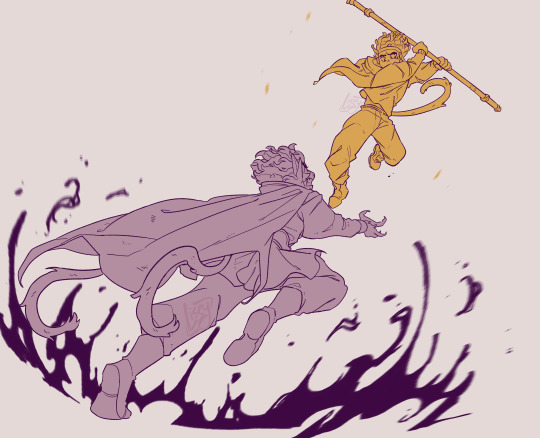

#liseysart#asks#lego monkie kid#lego monkey kid fanart#illustration#lmk fanart#comic#lmk macaque#lmk mk#liseys old art
873 notes
·
View notes
Note
Hello, IDK if you ever drew this, but can we get monkey Mk please?
I’ve drawn him quite a bit. MK is one of my favorite characters to draw, I love giving him a bold strong face with big goofy eyes
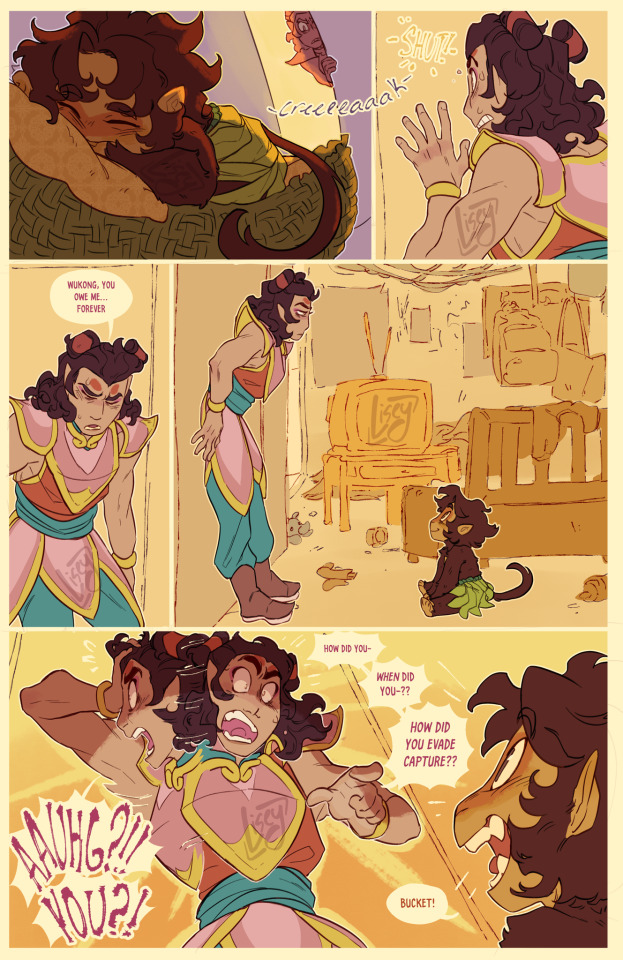
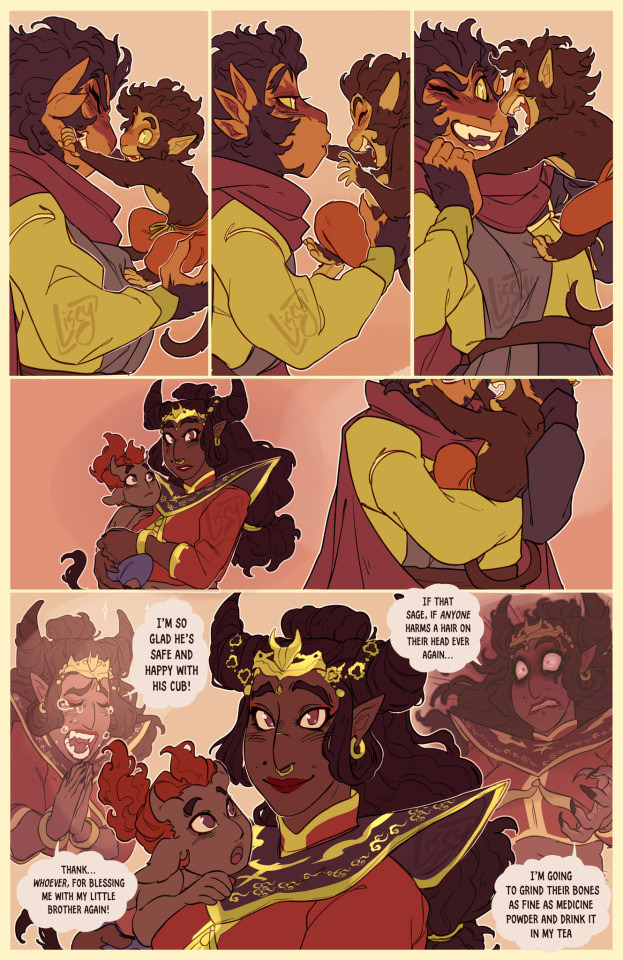
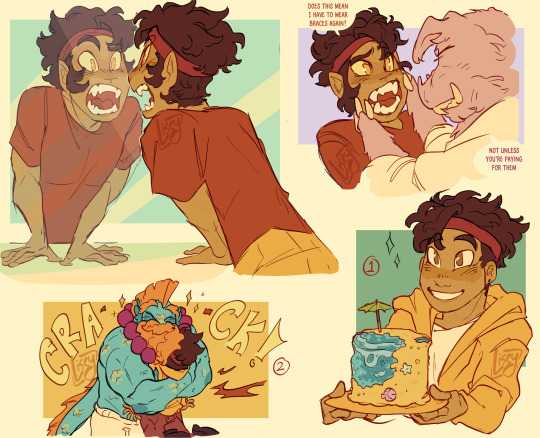
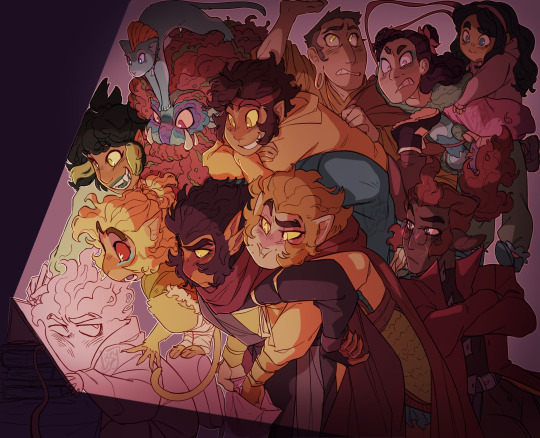






#liseysart#liseys old art#lmk redson#lego monkie kid#lego monkey kid fanart#comic#illustration#lmk fanart#asks#lmk mk#lmk xiaotian#lmk princess iron fan#lmk nezha#lmk macaque#lmk mei#lmk xiaojiao
3K notes
·
View notes
Note
I love the "I dream I was kissing yo- A RANDOM GIRL" "Great save, 'and totally not you'" comic so much, i think the way u make expressions is great and ur lineart is so COOL 👏✨✨✨✨
Thank you thank you! I listen to Game Grumps 70% of the time I'm working, and that bit came on while I was drawing a comic. I stopped drawing the comic specifically to draw that bit with them because it makes me laugh so much, same with this comic!

#lego monkie kid#liseysart#asks#lego monkey kid fanart#comic#lmk fanart#lmk pigsy#lmk tang#game grumps#liseys old art
1K notes
·
View notes